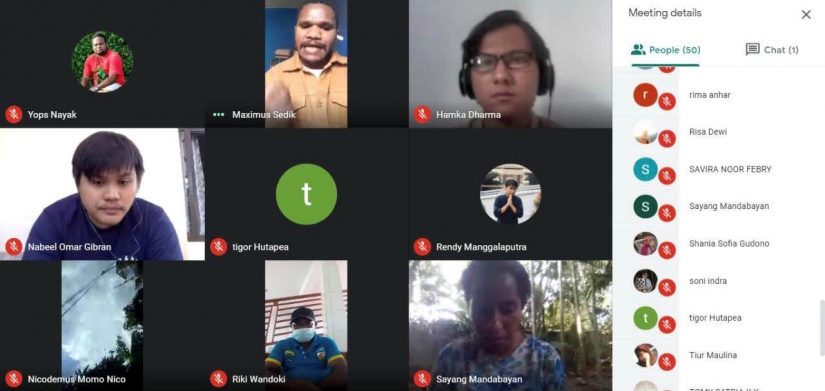
Yogyakarta, 27 June 2020—Virtual discussion Warung Politik organized by Korps Mahasiswa Politik dan Pemerintahan (Student Corps of Government and Political Science) FISIPOL UGM was successfully held under the theme of “We Are Papua, #PapuanLivesMatter (Racism and Suppression of Political Freedom)”. Present were Cahyo Pamungkas as a LIPI Researcher focusing on the research titled Roadmap 4 Masalah Papua, Tigor Hutapea as a representative of Yayasan PUSAKA Bentala Rakyat, Sayang Mandabayan as an ex-political prisoner as of September 2019, and Maximus Sedrik representing Aliansi Mahasiswa Papua.
Speakers, through various perspectives, advanced the flow of the discussion by providing diverse insights on the issue of discrimination against people of Papua. Maximus Sedrik commenced the discussion by telling the forum his personal experience of racial discrimination as a Papuan student in Java. According to Maximus, Papuan fellows often experience such discrimination, particularly when organizing discussions. Movements initiated by Papuan students are constantly labelled as a separatist movement.
Amidst the global health and economic crisis, humanity is ameliorated with the rise of civil solidarity fighting for humanitarian issues. Apparent was this phenomenon, most importantly, in George Floyd’s case, where Floyd became a victim of the American police’ racial discrimination. Not only were the voices advocating equal rights exhibited in the United States, but also in Indonesia, where the issue of discrimination against Papuan fellows had been long unheard of. The current issue has been studied by different groups of society, with university student as no exception. The students are actively fighting to dismantle racial discrimination and political suppression perpetually encountered by Papuan fellows.
Similar discrimination occurred to Sayang Mandabayan, formerly a political prisoner accused of treason after waving the Morning Star Flag in a protest. Sayang underwent an intimidating legal process, in which a fake witness was staged to testify against him before the court. To the audience, Sayang admitted that discrimination and intimidation he encountered scarred him deeply to this day. He reckoned that Indonesia failed to integrate Papua into the country, as multiple problems in Papua had not been addressed by the government.
Responding to the parties who had spoken up on the issue, Cahyo Pamungkas presented his four-year team research titled RoadMap 4 Masalah Papua, signifying four different issues regarding Papua which had been left unattended. The first topic covers historical and political matters requiring clarification from the state. The second regards records of political violence and neglect of human rights generating collective suffering/memoria passionis for people of Papua. Third, the research also focuses on the state’s failure in pursuing a culture-based development for Papua, which ended up marginalizing and depopulating the land. Lastly, the problem of discrimination and marginalization of Papua in different aspects—concerning economic, cultural, and political ones—too, stand as a highlight in Cahyo’s research.
Meanwhile, Tigor Hutapea underlined the social construction that supports hatred and racism. The stigma on people of Papua—primitive, violent, backward—was used to support discrimination and eventually created a social bias. Such bias directly affects the lives of Papuans, i.e. the education system being generalized to that of the people of Java. This results in marginalization of Papuan rights. The established legal system also represses Papuans’ political freedom, demanding the state to perform a legal reform to realize responsive and anti-discriminative law enforcement efforts for the people of Papua.
Actual encounters experienced by our Papuan fellows, as previously described, exhibit the significance of the hashtag #PapuanLivesMatter in standing for numerous unresolved issues regarding Papua that are often ignored by the state. This calls for relentless fight for human rights to realize better lives for our Papuan fellows by abolishing discriminative and racist tendencies.
